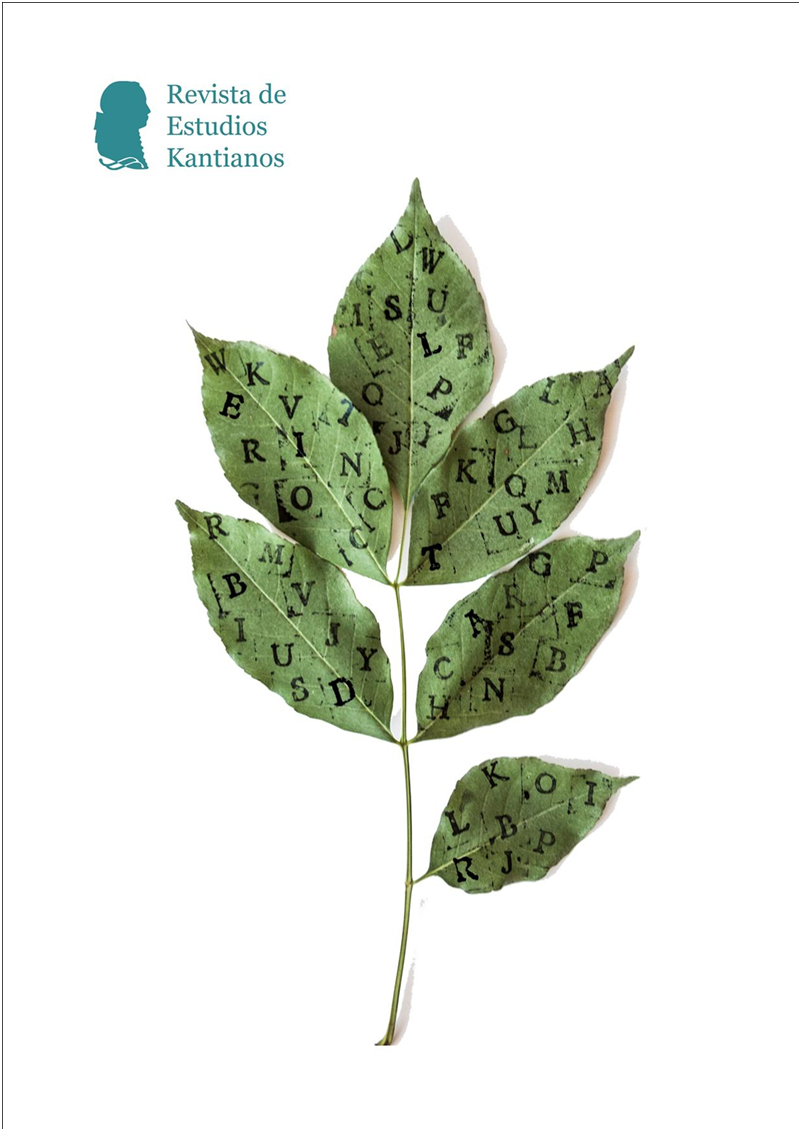Reason and its Bedürfnis
DOI:
https://doi.org/10.7203/REK.9.1.28138Palabras clave:
needs of reason, significance, locality, metaphysics Resumen
Resumen
In this article I argue that the notion of Bedeutung (meaning, sense) in Kant is closely related to that of Bedürfnis (need) and that the former can be better understood by clarifying the latter. After an initial overview of the needs of reason in general, I will focus on the two directions of this need in order to state that they characterise reason and make it local. By this I mean that reason, while aspiring to wholeness, only functions adequately within a limited framework. It is from the cooperation of both directions of reason’s needs that meaning develops.
 Descargas
Descargas
 Citas
Citas
Allison, H. (2000). Is the Critique of Judgment ‘post-critical’? In S. Sedgwick (Ed.), The Reception of Kant’s Critical Philosophy: Fichte, Schelling and Hegel (pp. 78–92). Cambridge University Press.
Beneke, F. E. (1832). Kant und die philosophische Aufgabe unserer Zeit. Mittler.
Birken-Bertsch, H. (2015) Interesse. In M. Willaschek, J. Stolzenberg, G. Mohr, and S. Bacin (Eds.), Kant-Lexikon (pp. 1181–1188). Walter de Gruyter.
Brandt, R. (1989). The Deduction of the Critique of Judgment: Comments on Hampshire and Horstmann. In E. Förster (Ed.), Kant’s Transcendental Deductions (pp. 177–192). Stanford University Press.
Engelhard, K. (2015). Bedeutung, transzendentale. In M. Willaschek, J. Stolzenberg, G. Mohr, and S. Bacin (Eds.), Kant-Lexikon (pp. 222–223). Walter de Gruyter.
Ferrarin, A. (2015). The Powers of Pure Reason: Kant and the Idea of Cosmic Philosophy. University of Chicago Press.
Guyer, P. (1997). Kant and the Claims of Taste. Cambridge University Press.
Hamann, J. G. (1825). Metakritik über den Purismus der reinen Vernunft. In F. Roth (Ed.), Hamann’s Schriften (pp. 1–17). Reimer.
Herman, B. (1984). Mutual Aid and Respect for Persons. Ethics, 94(4), 577–602.
Horstmann. R. (1989). Why Must There Be a Transcendental Deduction in Kant’s Critique of Judgment? E. Förster (Ed.), Kant’s Transcendental Deductions (pp. 157–176). Stanford University Press.
Kant, I. (1990–). Gesammelte Schriften. Berlin-Brandeburgische Akademie der Wissenschaften. Walter de Gruyter [1992–2016, Cambridge Edition of the Works of Immanuel Kant. Cambridge University Press].
Makkreel, R. (2006). Reflection, Reflective Judgment, and Aesthetic Exemplary. In R. Kukla (Ed.), Aesthetics and Cognition in Kant’s Critical Philosophy (pp. 223–244). Cambridge University Press.
Mora, A. M. (2009). Sensibilización y moralidad en Kant. Eidos: Revista de Filosofía de la Universidad del Norte, 10, 92–133.
Neuhouser, F. (2014), Rousseau’s Critique of Inequality: Reconstructing the Second Discourse. Cambridge University Press.
Nuzzo, A. (2008). Ideal Embodiment. Bloomington.
Rawls, J. (2003). Lectures on the History of Moral Philosophy. Cambridge University Press.
Rousseau, J.-J. (1959–1969). Emile. In Œuvres Complètes, Vol. 2. Gallimard.
Sticker, M. (2022). True Need in Kant. Kant-Studien, 113(3), 432–458.
Tuschling, B. (1992). The System of Transcendental Idealism: Questions Raised and Left Open in the Kritik der Urteilskraft. The Southern Journal of Philosophy, 30, 109–127.
Willaschek, M. (1998). Phaenomena/Noumena und die Amphibolie der Reflexionsbegriffe (A235/B294–A292/B349). In G. Mohr, and M. Willaschek (Eds.), Klassiker Auslegen. Immanuel Kant: Kritik der reinen
Vernunft (pp. 324–352). Berlin Akademie Verlag.
Willaschek, M. (2018). Kant on the Sources of Metaphysics. The Dialectic of Pure Reason. Cambridge University Press.
Descargas
Publicado
Cómo citar
-
Resumen98
-
PDF 31
Número
Sección
Licencia
![]()
Los autores que publican en esta revista están de acuerdo con los siguientes términos:
- Los autores conservan los derechos de autor y garantizan a la revista el derecho de ser la primera publicación del trabajo al igual que licenciado bajo una Creative Commons Attribution License que permite a otros compartir el trabajo con un reconocimiento de la autoría del trabajo y la publicación inicial en esta revista.
- Los autores pueden establecer por separado acuerdos adicionales para la distribución no exclusiva de la versión de la obra publicada en la revista (por ejemplo, situarlo en un repositorio institucional o publicarlo en un libro), con un reconocimiento de su publicación inicial en esta revista.
- Se permite y se anima a los autores a difundir sus trabajos electrónicamente (por ejemplo, en repositorios institucionales o en su propio sitio web) antes y durante el proceso de envío, ya que puede dar lugar a intercambios productivos, así como a una citación más temprana y mayor de los trabajos publicados (Véase The Effect of Open Access) (en inglés).








